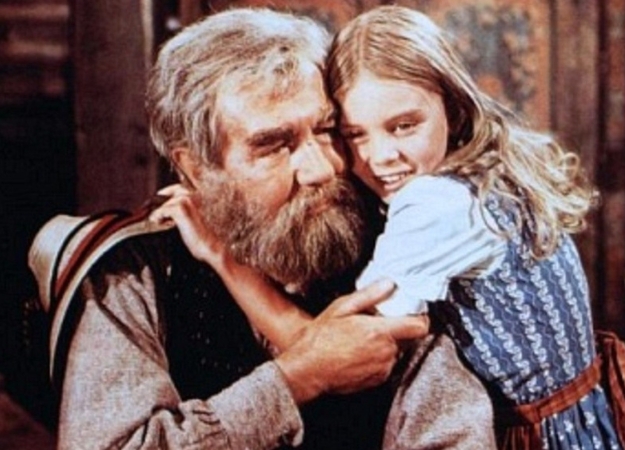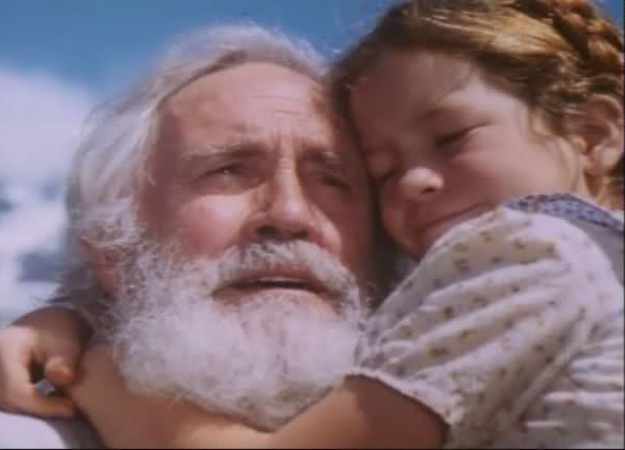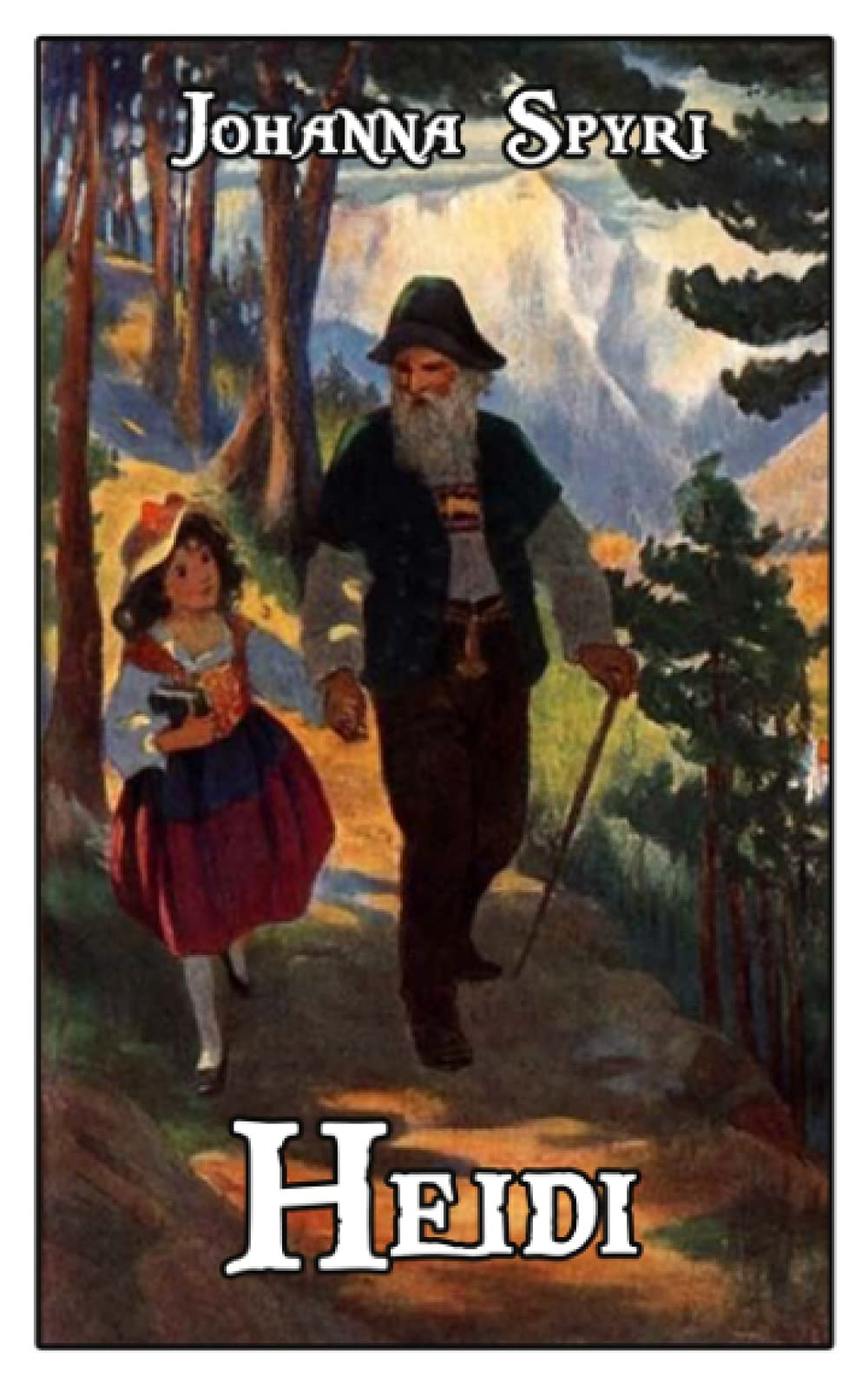Don't miss your chance to invest in 'Fabiola'!
Visit our crowd-funding page to help make Catholic movies!
- Home
- Books Made into Movies
- Heidi
Heidi The Heartwarming Childhood Drama On Film And Print
Disclaimer: As an Amazon Associate, I receive a small commission if you purchase items on this page at no extra cost to you.
Heidi's unwavering obedience, Clara’s generosity, and Grandfather’s transformation highlight the religious triumphs in Heidi. As the story unfolds, compassion and faith overcome all obstacles, making Heidi a timeless tale of moral triumph.
Heidi is one of the first books that I read aloud to my children. I loved the idea of the simple life with the goats in the Alps. In the book, Heidi's Christian name is Adelaide. I named one of my daughters Adelaide after this classic children's novel written by Swiss author Johanna Spyri. Published in the early 1880s, the story features the beautiful bond formed by Heidi with her cranky grandfather, the simple charm of a rustic life in the Alps, and lessons on how to be a truly Christian friend and neighbor.
There are several movies based on Heidi, including the 1937 film starring Shirley Temple, the 1968 made-for-television movie, and the Disney mini-series starring Jane Seymour. While these adaptations may stray from the book, they focus on Heidi and her adventures with Peter the goatherd while living with her grandfather. Later, she moves to the busy city of Frankfurt, where she lives with her uncle and her disabled cousin, Clara.
Heidi Taken To The Screen In Film Adaptations Of "The Favorite Classic Children's Tale"
There have been several Heidi film adaptations, including a popular performance by Shirley Temple. Our favorite Heidi adaptation, however, is the 1968 TV movie with Maximilian Schell (The Reluctant Saint).
The orphan Heidi is taken to the Alps to live with her reclusive Grandfather. Initially, she must cope with his gruff, distant demeanor, but over time, she wins him over. The two develop an affectionate bond.
Heidi's days are spent frolicking in the sunshine and playing with goats on the mountainside.
But, Heidi's Uncle Richard sees a perfect opportunity for Heidi by adopting her, thus opening the door to a better life for Heidi as well as acquiring a companion for his sour, spoiled and crippled daughter, Clara.
Believing he is helping by relieving the old man of a burden, Uncle Richard climbs the Alps to take Heidi home with him to Frankfurt. There, she becomes friends with Clara, brightening her life with her cheerful personality. However, Heidi grows homesick and begs to return to the Alps.
Back at the Alps, Heidi is convinced that the mountain air would do Clara good, and Grandfather invites her to spend two weeks in Switzerland. During her stay, Grandfather explains to Clara that there is a fear of trying something difficult in every man. He convinces Clara that as soon as she gains the courage to try, a miracle can happen.
The notable twist in this movie is the portrayal of Fräulein Rottenmeier as a kind governess, unlike the villain she appears to be in the novel. Clara confides in Heidi that the governess is in love with her widowed father. This change turns the traditional Heidi story into a romance akin to The Sound of Music.
This was a good script choice but overall the story seems to fall short on character development. There isn't a strong connection to Clara's triumphs, nor does the romance between Herr Sesemann and the governess evoke much feeling. What the movie does accomplish is an admiration for a simple and arduous life in the countryside and a nostalgic retelling of a beloved children's novel.
The Missing Magic in Disney's Heidi 1993 TV Adaptation
The 1993 Disney TV version of Heidi stays very true to almost every plot point of Johanna Spyri's story. Told over four episodes, the adaptation closely follows Heidi's journey from the Alps to Frankfurt. After getting comfortably settled in with her crotchety grandfather in the Alps, Heidi is just as suddenly whisked away from him again. She goes to the bustling city of Frankfurt where she is companion to Clara, a spoiled crippled girl.
In Frankfurt, life is very different. The strict governess Fräulein Rottenmeier finds everything Heidi does an annoyance. Heidi longs to return to her accustomed free life on the mountains. In Frankfurt, she learns to read and longs for the day when she can return to share the beautiful stories she has read with Grandmother, who she believes would be cheered by them despite her blindness.
After a time in Frankfurt, Heidi falls ill from homesickness. The doctor recommends a trip back to the Alps to cure her. Heidi rejoices in her return to Grandfather but is saddened by the thought that she may have to leave him again. She convinces Clara to join her in the Alps, where the mountain air will help Clara regain her strength. A desperate moment demands that Clara make an effort to help herself, bringing the film to a happy outcome for the poor crippled girl.
As for Heidi, Herr Sesemann and Clara both know that it would be too cruel to both her and Grandfather to separate them again and Heidi is allowed to stay in her true home: the Alps.
With a storyline so true to the book, you may wonder why I say that it lost its magic. Although this adaptation follows the book faithfully, it lacks the religious depth of the original story. In the book, Heidi's faith in God plays a key role in her happiness, and her prayers are central to her character's charm. In this version, however, the religious elements are replaced with scenes of Heidi crossing her fingers and wishing upon a star.
This makes the film feel completely secular and misses the entire point of the story.
Unlock the True Charm of Heidi: Why the Book Reigns Supreme
Johanna Spyri’s Heidi beautifully showcases the transformative power of Christian virtues. Through the kindness and selflessness of Heidi, Clara, and Grandfather, the novel illustrates how faith and love can reshape lives and create lasting bonds.
Take a trip into the Swiss Alps and join Heidi in an adventure everyone is sure to love.
In this wonderful novel, Johanna Spyri compares life in the nineteenth century rural Swiss Alps with life in the urban city of Frankfort, Germany, as she shares the experience of a kind child named Heidi.
As a young girl, Heidi lives with her reclusive grandfather in his out-of-the-way mountain home and, while living there, befriends a young goat herder named Peter.
Later, she is forced to go live in the large city of Frankfort to be a companion of a girl named Clara. Despite many hardships, Heidi treats others with compassion, and during her time in Frankfort, she learns about a loving God and this greatly changes her life.
Heidi's unwavering obedience, Clara’s generosity, and Grandfather’s transformation highlight the religious triumphs in Heidi. As the story unfolds, compassion and faith overcome all obstacles, making Heidi a timeless tale of moral triumph.
Engage With The Adaptations: Which One Captures Heidi's Spirit Best?
Which adaptation do you feel best captures the essence of Heidi? Is it the nostalgic charm of Shirley Temple's version, the romantic twist of the 1968 movie, or the faithful retelling of the 1993 TV series? Share your thoughts on which version truly brings Heidi’s character to life to you.
Subscribe To Our FREE Email Newsletter:
Our Mission
We believe storytelling has the power to shape souls. In a world where mainstream media often undermines faith and virtue, we are dedicated to reclaiming the art of filmmaking for Christ and His Church. Our mission is simple yet bold: to populate the movie industry with good, Catholic films that inspire, uplift, and ignite a love for truth and beauty.
Populating the movie industry with good, Catholic films that inspire, uplift, and ignite a love for truth and beauty.














